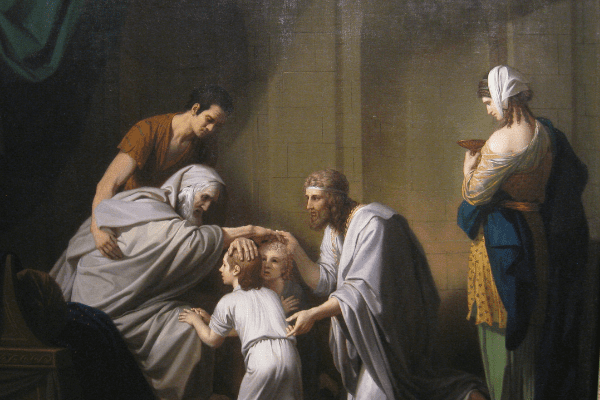The Torah portion of Vayechi (Genesis 47:28–50:26) tells of the end of Jacob’s life. He lives the last 17 years of his life in Egypt. When he is about to leave the world, Joseph brings his two sons, Ephraim and Manasseh, to his father to be blessed. As part of the blessing, Jacob says that all future generations will bless their children to be like Manasseh and Ephraim (Genesis 48:20):
By you shall Yisrael invoke blessings, saying: Hashem make you like Ephraim and Manasseh.”
This is acted out every Shabbat evening when fathers bless their children. Fathers reface their blessing of their sons by invoking the verse, “May Hashem make you like Ephraim and Menashe” (Genesis 48:20). This is in contrast to the blessing of the daughters which invokes the matriarchs, Sarah, Rebecca, Rachel, and Leah. It seems more fitting to invoke the patriarchs for the sons as well, why do we bless them to be like Ephraim and Manasseh?
By blessing our sons to be like Ephraim and Manasseh, we are blessing them with a life devoid of strife. All of the patriarchs struggled in order to develop spiritually. Abraham had to emigrate to a foreign land and underwent ten major tests. Isaac had to lay himself down on an altar and prepare himself to be sacrificed. Jacob struggled with his twin in the womb, a struggle that continued for many decades. A new nemesis, Laban, cheated him several times, costing him years of hard labor. His troubles continued as he mourned Joseph, thinking he was dead for 22 years.
It is not until Ephraim and Manasseh that we see examples of people who dedicate their lives to serving God and do not face tribulation. Yet their spiritual development places them on a level with the sons of Jacob, setting them as tribes in their own right.
Rabbi Ovadia Hadiah, born in 1890 in Aleppo, Syria, offered a different explanation. Rabbi Hadiah noted that Joseph’s sons were raised in Egypt in a household visited by Egyptian officials, and a society devoid of morality. Egyptian society was based on idolatry and injustice. Nonetheless, they held fast to their religious identity. They resisted outside influences and stayed true to their father’s teachings. Ephraim and Manasseh were strong, confident, and secure in who they were and in their mission in life.
This idea is expressed in Jacob’s blessing to his grandchildren. When Jacob blesses Ephraim and Menashe, he uses a strange phrase, saying, “And may they be teeming multitudes upon the earth” (Genesis 48:16). The Hebrew words used, v’yidgu larov b’kerev ha’aretz, are deeply symbolic, with the root of the word v’yidgu deriving from the Hebrew word dag, meaning fish. Rabbi Shmuel Kogan offers an insightful interpretation of this symbolism. He suggests that, akin to a healthy fish that has the strength and determination to swim upstream, Ephraim and Menashe exhibited remarkable character. Despite being immersed in Egyptian society, known for a culture and values often in conflict with Jewish teachings, these two figures managed to maintain their integrity and Jewish identity. They metaphorically ‘swam upstream’, resisting the prevailing currents of Egyptian immorality and cultural influence, steadfastly adhering to their Jewish values. This ability to remain true to their beliefs in the face of adversity and societal pressure is what set Ephraim and Menashe apart as exemplars of strength and character.
This understanding of the blessing to be like Ephraim and Manasseh took on great importance as the Children of Israel suffered through their 400-year exile in Egypt, and served as a beacon during the 2,000-year exile that followed the destruction of the Temple in Jerusalem.
Ephraim and Manasseh are also the first siblings in the Torah who are not at odds with each other. Beginning with the first brothers, Cain and Abel, the Torah is replete with sibling rivalry. When Jacob was blessed before his older brother, Esau chased him and threatened him. When Jacob switched the blessing, putting the younger, Ephraim, before the older, Manasseh, however, no conflict ensued. Manasseh did not seek vengeance nor did Ephraim lord it over his older brother. Brotherly love wins out.
As King David sings (Psalms 133:1):
How good and how pleasant it is that brothers dwell together.
As any parent can attest, the greatest blessing is children who love each other, get along and help each other out. This is also God’s wish for His children. The nation of Israel is, after all, one large family.
The blessing of the children, an invaluable element of the Sabbath, is done before the Friday night meal. The blessing is done in a similar manner to how the Kohanim (priests) bless Israel. The father places his hands on the head of each child, blessing them individually, usually beginning with the oldest and ending with the youngest.
For sons, the introductory line is:
May God make you like Ephraim and Manasseh.
יְשִׂמְךָ אֱלֹהיִם כְּאֶפְרַיְם וְכִמְנַשֶּׁה
y’-si-m’-KHA e-lo-HEEM k’-ef-RA-yim v’-khim-na-SHEH
For girls, the introductory line is:
May God make you Sarah, Rebecca, Rachel, and Leah.
יְשִׂמֵךְ אֱלֹהיִם כְּשָׂרָה רִבְקָה רָחֵל וְלֵאָה
y’-si-MAYKH e-lo-HEEM k’-sa-RAH riv-KAH ra-KHAYL v’-lay-AH
For both boys and girls, the rest of the blessing is:
May God bless you and protect you.
יְבָרֶכְךָ יְהוָה וְיִשְׁמְרֶךָ
y’-va-re-kh’-KHA a-do-NAI v’-yish-m’-RE-kha
May God show you favor and be gracious to you.
יָאֵר יְהוָה פָּנָיו אֵלֶיךָ וִיחֻנֶּךָּ
ya-AYR a-do-NAI pa-NAV ay-LE-kha vee-khu-NE-ka
May God show you kindness and grant you peace.
יִשָּׂא יְהוָה פָּנָיו אֵלֶיךָ וְיָשֵׂם לְךָ שָׁלום
yi-SA a-do-NAI pa-NAV ay-LE-kha v’-ya-SAYM l’-KHA sha-LOM
NOTE: The blessing is usually followed by a kiss and hug.







